Reports of CMX Short-term Dispatch/Invitation Program for International Collaborative Research in FY 2023
Dispatch to Lariboisière Hospital, Université Paris, France 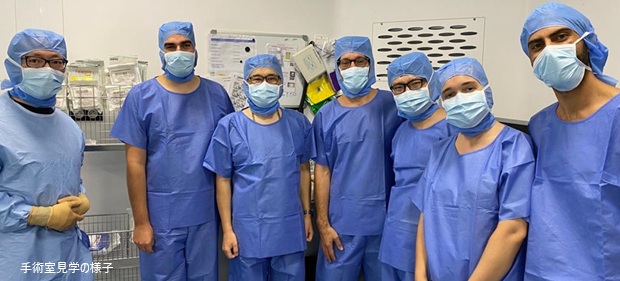 With the support of the CMX “International Collaborative Research Short-Term Dispatch and Invitation Program," I was dispatched to Université Paris Cité, France (Dispatch period: August 26-31, 2023). During my stay in France, a workshop was held by the Department of Neurosurgery at Université Paris Cité. Participants included members from our research lab (Professor Matsumoto and myself, Kimura), the Department of Neurosurgery at Kobe University (Assistant Professor Fujimoto), the Department of Neurosurgery at Université Paris Cité (Professor Emmanuel Mandonnet and one resident), and the French National Institute for Research in Computer Science and Automation (Inria) (Chief Researcher François Bonnetblanc, one postdoctoral researcher, and two graduate students). From Japan, we presented on cortico-cortical evoked potentials as electrophysiological indicators of brain activity, covering examination methods (effects of stimulation parameters on potentials) and analysis results (including high-frequency analysis). The French team presented on the evaluation methods for brain networks used in neurosurgery, as well as simulation models of white matter stimulation and evoked brain potential analysis methods. We engaged in thorough discussions over an extended period. Additionally, we observed a brain tumor resection surgery in the operating room, learning the methods of white matter stimulation and analysis techniques used during surgery. By holding face-to-face discussions on-site in France, we were able to advance detailed and smooth discussions on stimulation methods for the cortex and white matter and the parameters to be measured. 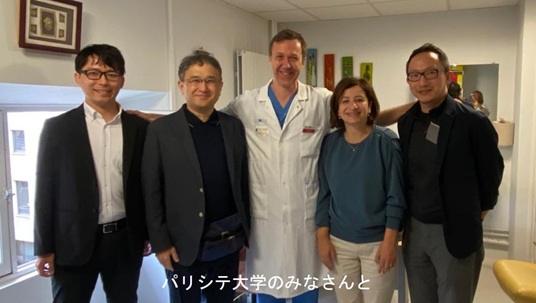 |
Dispatch to the University of Bordeaux, France
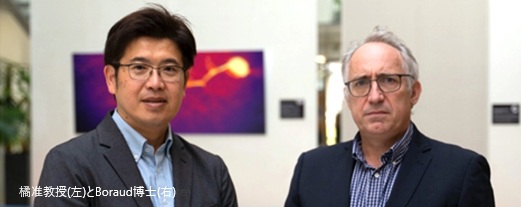 Thanks to the CMX International Collaborative Research Short-term Dispatch and Invitation Program, I visited the University of Bordeaux from March 18th to 24th, 2024. The main purpose of my stay was to visit Prof. Thomas Boraud, renowned for his research on the basal ganglia, and discuss how to advance our collaborative research on elucidating the pathological mechanisms of addiction. Prof. Boraud is a leading researcher in basal ganglia research, having first conducted clinical applications and elucidations of the mechanisms of deep brain stimulation in patients with Parkinson's disease. I have had an exchange with Prof. Boraud for over ten years, during which we have co-organized symposiums at academic conferences and exchanged opinions on basal ganglia research. This was my first visit to the University of Bordeaux, where we concretely planned the research to be proposed for an international grant. In addition to Prof. Boraud, the University of Bordeaux is home to many internationally renowned basal ganglia researchers, including Dr. Nicolas Mallet and Dr. Jérôme Baufreton. I had very extensive discussions with each of them. It was also very meaningful to have the opportunity to present my research in a seminar format and engage in discussions. I would be even more pleased if this visit leads to the successful adoption of our international grant proposal. I would like to express my deep gratitude to CMX for providing such an opportunity, as well as to the research support division for their assistance. |
|
dispatch to Medical Informatics/Biomedical Image Analysis Universitätsspital Zürich, Swizerland 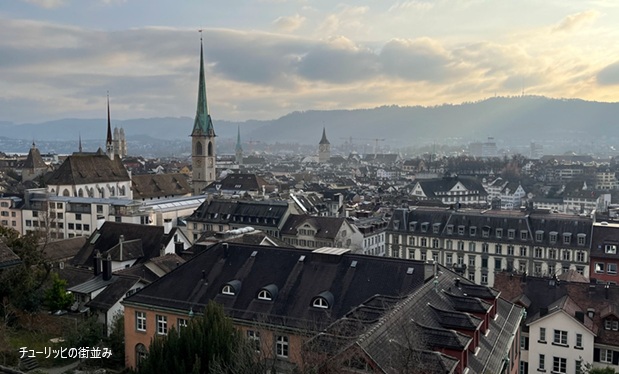 In March 2024, as a precursor to the commencement of an international collaborative research project set to begin in April, we visited the University of Zurich. This visit was orchestrated to lay the groundwork for joint research between Kobe University, Kyoto University, and the University of Zurich, focusing on the integration of Zurich's multilingual LLM technology with Japan's high-quality medical information to develop an LLM capable of handling Japanese with high accuracy. During our visit, we engaged in intensive technical exchanges and discussions based on seven research stages: data collection, data preprocessing, foundational LLM construction, LLM training, on-premises environment setup, LLM improvement, and LLM performance evaluation. Key issues discussed included the construction of a Japanese medical information-compatible LLM, the operation of LLM in an on-premises environment, and the evaluation of its multitasking capabilities. It was noteworthy that the Zurich team's laboratory is part of the Swiss national project 'AI Initiative,' securing 20,000 hours of computational resources per month. Furthermore, through collaborative efforts, significant advancements in LLM research using medical imaging are anticipated. However, challenges in data sharing due to privacy protection were recognized, and these will be addressed as future challenges. This visit not only established a strong foundation of trust but also prepared us for the upcoming joint research. We are deeply grateful for this invaluable opportunity provided by the Medical Transformation Research Center and all associated personnel. |
|
Invitation from Department of Pediatric Medical Faculty Universitas Padjadjaran, Indonesia 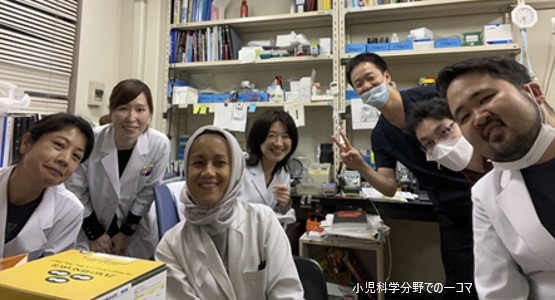 Dr. Rini Rossanti was invited from Padjadjaran University in Indonesia from February 3, 2024 to 19th with the support of Center for Medical Transformation (CMX) short-term dispatch/invitation program. She was previously engaged in research on pediatric genetic kidney disease, focusing on nephrotic syndrome, at Kobe University Graduate School of Medicine (Pediatrics), and after receiving her PhD in 2022, she has continued her research while working as a pediatric nephrologist in Indonesia. She aims to establish a genetic diagnostic system for steroid-resistant nephrotic syndrome in Indonesia by utilizing her research experience in Japan. As a first step, she has decided to conduct a comprehensive genetic analysis of steroid-resistant nephrotic syndrome in Indonesia using a next-generation sequencing system with the support of our department. In total, 24 patients were analyzed during her stay, and gene abnormalities were identified in 5 patients. She is currently preparing to increase the number of cases and conduct the analysis in Indonesia. Through this invitation project, we were able to advance the collaboration research. We would like to express our sincere gratitude to the Medical Transformation Research Center and the Research Support Division for giving us this opportunity. |
|
Invitation from Harvard Medical School, the USA
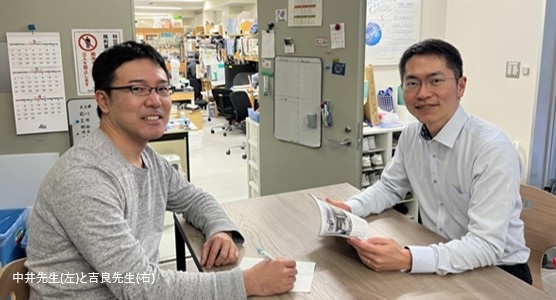 We received support from this program for inviting Dr. Shinichiro Kira from Harvard University in the United States in March 2024. Our department has been working on social behavior experiments with mice using VR technology and brain imaging. We aimed to further develop our research by collaborating with Dr. Kira, who excels in neuroscience research using VR behavioral tasks. During his stay at Kobe University, we were able to deepen our knowledge of spatial navigation tasks using mouse VR, two-photon calcium imaging, and optogenetic manipulation experiments through the CMX seminar. We also compared the VR experimental systems of our department and Harvard University. Dr. Kira provided valuable advice on improving the VR system, such as introducing efficient sensing technology for treadmill movement in the experimental platform. This effort has become the foundation for understanding brain functions in social navigation using VR systems and has led to the development of experimental systems combining optogenetic manipulation for future research. Additionally, Dr. Kira engaged in one-on-one discussions with young faculty members and graduate students in our department. These sessions provided not only advice on research content but also opportunities for young staff to learn about approaches to research abroad and the importance of career paths, making it an extremely fruitful experience. Lastly, we would like to express our heartfelt gratitude to all CMX staff members who provided us with this valuable opportunity. |